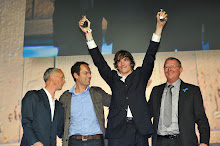Let's heal
The presentation of the book, by Mark Woerde
As a copywriter, I've always admired people who've written a book. I mean, during more than 5 years that I'm writing for this blog I've already written enough content for two books. But to actually get your writings published, that's a whole different ballgame.
My former boss Guillaume van der Stichelen has succeeded in doing that. And now my current boss Mark Woerde wrote a book. It's about a theory that's as contemporary as it's interesting, and it asks the question: what if brands (and advertising) would provide meaningfulness for others. I'm not talking about meaningfulness in the sense of 'making people feel good' or 'giving the ultimate cooking experience' but actually helping people. This means, using advertising to create a better world.
Now this last thing sounds a bit Michael Jackson and the combination with advertising sounds like one big paradox. But at Lemz we're already making campaigns based on this principle. Some might think see connecting your brand to a good cause as an excuse to sell your product. But this book explains why it's actually a good thing. And how you can be truly meaningful instead of just telling that you're supporting a good cause.
He ends his book by challenging brands to win the Nobel Prize for Peace. Okay, it's a bit ambitious. But to say with the words of Leo Burnett: 'when you reach for the stars, you might not quite get one, but you won't come up with a handful of mud either."


4 Comments:
http://nl.wikipedia.org/wiki/Juxtapositie
Juxtapositie
In de reclame wordt de juxtapositie toegepast om potentiële klanten op het verkeerde been te zetten en oorzakelijke verbanden te laten vaststellen, die er feitelijk niet zijn.
een boek
@ Sander: dat is heel erg achterhaald hoor. Zulke manipulatieve technieken stammen uit de jaren '60, maar daar trappen mensen tegenwoordig niet meer in. IKEA bijvoorbeeld, heeft als beleid dat ze nooit mensen misleiden. Simpelweg om teleurstellingen van klanten te voorkomen.
IKEA is een positieve uitzondering.
Ik zie het nog dagelijks in de reclame volop gebruikt worden om mij heen. Echt volop.
Het is gewoon het Pavlov-effect. Bijvoorbeeld door mooie vrouwen te 'koppelen' aan je product. Voorbeelden te over.
Water koken voor thee, stamt nog uit voor onze jaartelling. En dat wordt ook nog steeds zo toegepast. Het argument dat omdat iets uit de jaren '60 stamt, nu niet meer van toepassing is, klopt niet echt.
Echter IKEA is het blijkbaar wel ontgroeid. Da's mooi!
Post a Comment
<< Home